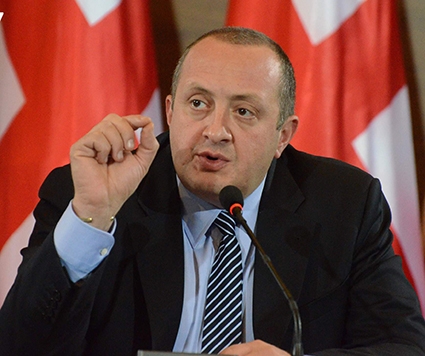President Margvelashvili Vetoes Controversial Bill on the National Bank of Georgia (NBG)
Giorgi Margvelashvili’s decision to veto the bill on the National Bank of Georgia (NBG) did not come as a surprise on July 31. The bill, initiated by two MPs: Tamaz Mechiauri, from the Georgian Dream-Democratic Georgia (GD) party and Nodar Ebanoidze, from the Republican Party, had become controversial immediately after its submission to the legislative body on May 21. The proposal envisaged setting up a Financial Supervisory Agency which would be in charge of monitoring and supervising the banking sector and other financial institutions, the functions which are currently carried out by departments of the central bank of Georgia.
Different stakeholders, including international financial institutions, business associations, opposition parties, a group of civil society organizations and the NBG itself, have criticized the proposal. Most of the critics cited the bill as being motivated by political reasons rather than economic ones, as it was initiated amid attacks from GD senior politicians against NBG President Giorgi Kadagidze. The central bank chief, whose term in office expires in February 2016, had become a target of attacks from GD politicians after the depreciation of national currency, as by May 2015 the Georgian Lari, which averaged 1.75 from 1995 until 2014, had decreased to 2.26 against the US Dollar.
On May 25, in a joint statement, business associations in Georgia said that the draft bill posed a threat not only to the banking system, but also to the country’s business and investment climate. In a joint letter to PM Irakli Garibashvili and Parliament Speaker Davit Usupashvili, the International Monetary Fund (IMF); European Bank for Reconstruction and Development (EBRD); Asian Development Bank (ADB), and the World Bank also called for keeping banking supervision inside the National Bank of Georgia (NBG).
Addressing the stakeholders’ worries, the Chairman of the Georgian Parliament personally assured that the legislative body was not going to finalize its work on the proposed bill until all issues of concern were agreed. As Parliament passed the proposal with its third reading on July 17, GD lawmakers and government said that in order to put the bill in line with international financial organizations’ recommendations, the initial bill was amended before it got final approval from the parliament.
Involved stakeholders remained unconvinced. Azim Sadikov, IMF resident representative to Georgia, noted that some issues still were unaddressed. The European Parliament Committee on Foreign Affairs (AFET) delegation, which came to visit to Georgia on July 26-27, also expressed further concern on the legislative amendments regarding the National Bank of Georgia (NBG) and its financial supervision powers, reminding the Georgian government that “independence of the monetary policy from political influence should be safeguarded.”
President Giorgi Margvelashvili, explaining his decision to veto the proposed bill last Friday, said the President’s Administration has been critical towards both the process through which the bill was adopted and its content. “Such hasty decisions may have an impact on the country’s macroeconomic stability and efficient implementation of monetary policy,” the President noted. Contrary to Parliament’s version, the alternative proposal of the President’s administration leaves the financial supervisory functions under the National Bank of Georgia. The President noted that this version is an optimal option for addressing the issue.
Unsurprised by the President’s decision, the GD party members in their commentary focused on political factors. One of the initiators of the draft bill, head of the Budget and Finance Committee of Georgian Parliament, Tamaz Mechiauri, said President Margvelasvili was elected by Bidzina Ivanishvili and people voted for him because of Ivanishvili. Another GD party member, Vice-Speaker of Parliament Manana Kobakhidze, further added that President Margvelashvili’s decision to veto the bill is in line with the agenda of the United National Movement (UNM), the former ruling party and current opposition in Georgian Parliament.
“I am the President elected by the Georgian people – the President, who took an oath of office not before the Georgian Dream, but before the population of Georgia to serve not a political party, but to serve the country,” President Margvelashvili said in response to the GD politicians. He further explained that veto is not an institute for political confrontation, but is a constitutional mechanism in cases when it is possible to achieve effective legislation, and support the strengthening and developing of the state. According to Margvelashvili, any attempt to portray the President in alliance with the opposition damages the ruling party and empowers the opposition.
During Giorgi Margvelashvili’s two years in office, this is the third presidential veto. The previous two were overridden by Parliament. The GD ruling coalition holds 86 seats in a 150 seat legislative body, where at least 76 votes are needed to overpower a President’s decision. It is most likely that the presidential veto on the NBG will also be overridden by the ruling coalition, as in the two previous cases. President Margvelashvili’s blocking of the bill, however, does give an opportunity for MPs to revise their decision.
Nino Japarashvili












